On reflection…
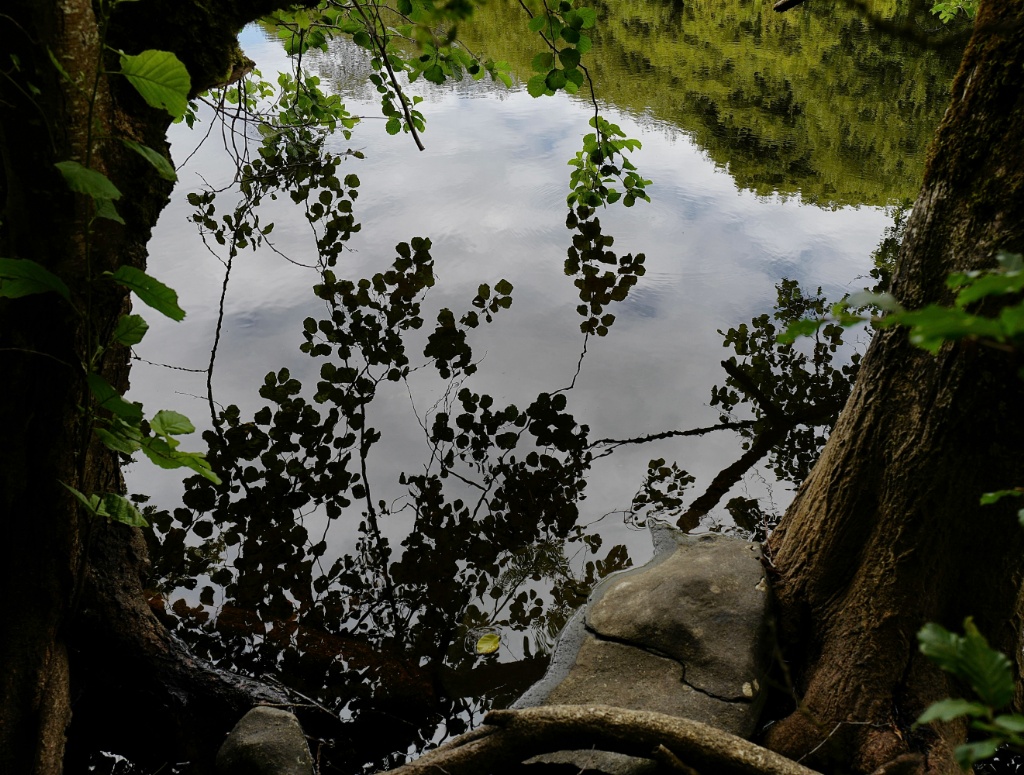
This is an enigmatic image. We were walking on the banks of the river Corrib in Cong and came on a large, placid pool, and I saw the overhanging branches of a tree reflected in the water. So I pressed the shutter. But ever since, when I happen upon the image I find myself doing a double-take, to try and orient myself. Which way is up?
Quote of the Day
“Politics is not the art of the possible. It consists in choosing between the disastrous and the unpalatable.”
- J. K. Galbraith, letter to JFK, 1962.
Musical alternative to the morning’s radio news
George Butterworth | English Idyll 2
I stumbled on this the other day and was enchanted by it. I knew nothing of Butterworth, so headed to his Wikipedia page. Like many of his generation, he died on the Somme in 1916.
Long Read of the Day
Searching for a Breakup
From CNN:
US prosecutors opened a landmark antitrust trial against Google on Tuesday with sweeping allegations that for years the company intentionally stifled competition challenging its massive search engine, accusing the tech giant of spending billions to operate an illegal monopoly that has harmed every computer and mobile device user in the United States.
In opening remarks before a federal judge in Washington, lawyers for the Justice Department alleged that Google’s negotiation of exclusive contracts with wireless carriers and phone makers helped cement its dominant position in violation of US antitrust law.
This looks like being a big deal. It’s the biggest case since the DoJ took on Microsoft in the 1990s. Scott Galloway has a terrific piece helpfully putting it in its proper context.
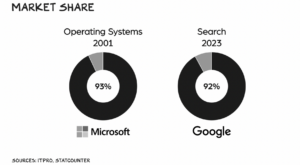
Google doesn’t dominate computing today to the extent Microsoft did in 1998. Nobody does, as “computing” is a much broader space. But its control of search — the most common entry point to the internet — is a nearly pitch-perfect echo of Microsoft circa 2001. Similarly, a quarter century after its founding, Google has a more than 90% market share, a sclerotic artifact of market power vs. a function of innovation. Its market dominance creates a virtuous cycle of increasing power. An estimated 9 billion Google searches occur every day, vs. 400 million for Bing. The massive delta of data and reach makes for a better product: Click-through rates for ads on Google are 30% greater than on Bing. More usage = more data = more advertising, and so on. Today, Google’s parent Alphabet is worth $1.75 trillion and employs 175,000 people.
Most people probably switch off when they hear the word ‘antitrust’. But this is an important case, not just for the tech industry but for liberal democracy generally. As the legal scholar Tim Wu puts it, the notion that power should be limited so that no person or institution can enjoy unaccountable influence is at the very root of a democracy.
The trouble is that liberal democracies have spent half a century building governance and regulatory systems which have allowed the emergence of uncontrolled monopolies not just in tech but in many other industries. If this is not reversed then we’re in deep trouble.
Which is why Scott’s piece is worth your time.
(For those who — like me — have to pay more attention to this, Matt Stoller has set up a free Substack newsletter which will report daily from the trial.)
The EU cable guys have tied down Apple, yet big tech is still bossing the Tories
Yesterday’s Observer column…
Sometimes, when Apple launches a new device (or even an upgrade of an existing one), it’s tempting to think that the accompanying blurb is a satirical spoof. On Tuesday, the day the iPhone 15 and iPhone 15 Plus were launched in California, for example, it burbled that both phones featured “industry-first colour-infused back glass with a stunning, textured matt finish and a new contoured edge on the aluminium enclosure. Both models feature the dynamic island which displays outputs and alerts and an advanced camera system designed to help users take fantastic photos of everyday moments in their lives. A powerful 48 megapixel main camera enables super-high-resolution photos and a new 2x telephoto option to give users a total of three optical zoom levels – like having a third camera. The iPhone 15 lineup also introduces the next generation of portraits, making it easier to capture portraits with great detail and low-light performance.”
Oh, and by the way, it also has a USB-C charging port…
If you’re really interested in the iPhone launch, then Jon Gruber’s long analysis is just the thing.
Nonsense on stilts
The Financial Times is a fine newspaper, but it has one intensely annoying appendage — a glossy colour magazine that accompanies the paper’s weekend edition and is aimed directly at the 0.01% . It was originally called “How To Spend It”, but this was eventually deemed to be too crass and so it’s now sneakily packaged as “HTSI”.
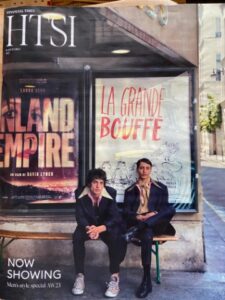
This weekend’s edition was beyond parody. It was largely taken up by umpteen two-page spreads of a pair of emaciated lads poncing about the streets of Paris dressed like expensive tramps, but what really took the biscuit was this little ‘feature’ for those heading for university in a week or two.
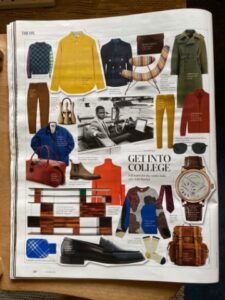
Among the essential items listed were:
- A suede backpack: £2,440
- A Lange & Sohne ‘Jumping Second’ wristwatch: £90,000
- A Paul Smith woollen sweater: £795
- A Burberry wool hot-water bottle: £290
- A Herno nylon trench coat: £1,295
- A 1953 ‘Vintage Reversivel’ armchair by Carlo Hauner & Martin Eisler: 48,000 Euros.
Two questions: who dreamed up this page? And what were they smoking at the time?
My commonplace booklet
Circular cats (cont.)
My good friend Miranda McArthur (Whom God Preserve), a talented painter, sent me this lovely pastel she did of her sister-in-law’s cat, who favoured a clockwise orientation!
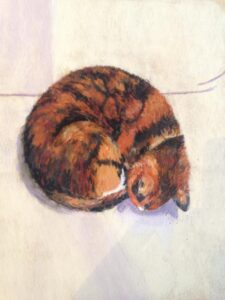
Linkblog
Something I noticed, while trying to drink from the Internet firehose.
On long reads
“Senior hack Adam Macqueen, who has worked for the Eye since 1997, thinks that the ‘long read’ could do with a rebrand: “‘I’ll Read That Later’ might be a better title in a lot of cases – I’d put money on an awful lot of them sitting on open tabs for weeks or months like those apples people buy with their lunch with the best of intentions and then leave on their desks to go all wrinkly and finally get thrown away. Obviously, there are some fantastic examples of the genre, but mostly I think if stories can’t be told short they’re quite often probably not stories.”
From an interesting piece in Press Gazetteby Charles Baker.
This Blog is also available as an email three days a week. If you think that might suit you better, why not subscribe? One email on Mondays, Wednesdays and Fridays delivered to your inbox at 6am UK time. It’s free, and you can always unsubscribe if you conclude your inbox is full enough already!
